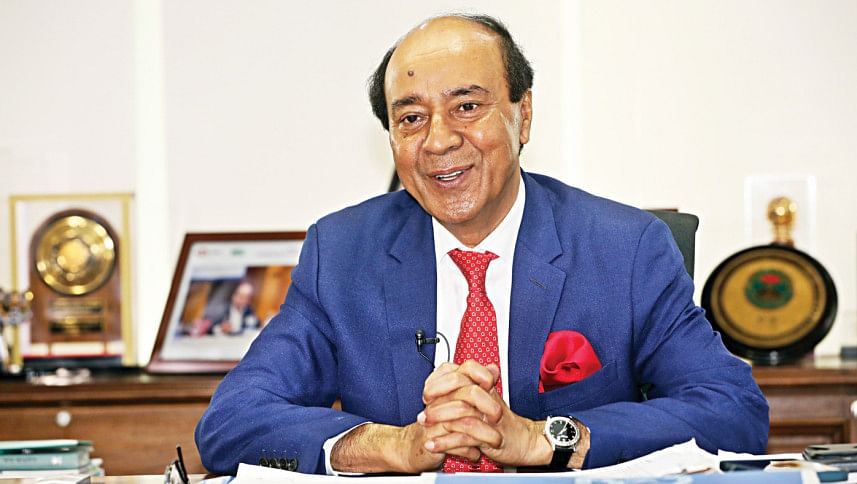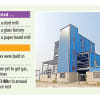The MGI story: From Tk 600 in his pocket to a Tk 36,000cr business empire

The Meghna Group of Industries (MGI), which markets products under the brand name "Fresh", attained a turnover of $3 billion (over Tk 36,000cr) in 2024 after embarking on its journey around 50 years ago.
The entity had opened in 1976 with capital of around Tk 600 to Tk 650.
Around Tk 300 of this capital was availed as a loan on mortgaging some land, said Mostafa Kamal, chairman and managing director of the group, in a recent interview at his office in Gulshan, Dhaka.
He took to doing business at a young age with no big plans. He sought to fulfil his childhood dream of becoming a businessperson, and that inspiration came from seeing his uncle's weekly trade of betel nuts.
He availed a trade licence under the name "Kamal Trading Company" showing the address of his brother's roadside shop at Sher-e-Bangla Nagar.
From vehicle business to demand orders, buying and selling was his primary business. Some of the business was profitable and some was not, Kamal said.
In 1989, he established his first factory, Meghna Vegetable Oil, to refine edible oil. From his own profit, he started diversifying the business, and now the group has 54 factories with four more to open soon.
"I targeted to expand my business to my backward and forward linkages when I felt that sometimes it became difficult to get necessary raw materials for my products," he said.
Kamal once felt that he had to face a huge queue to get cartons, and it delayed his product delivery. At that time, he planned to set up a carton factory.
"I consider the fact that whenever there is a crisis, there is an opportunity, so why should I not take up the opportunity," Kamal said.
"When we realised that we need drums, cartons, and shipping for importing and exporting our products, we expanded our business towards all of these from our basic business of edible oil," he added.
Regarding monitoring, Kamal said he still monitors his company's purchases and other operations with his own eyes, even though this is a big task.
"I do it so that I can give good advice and add value from my long experience, and I believe savings in purchases are earnings."
On whether the group defaulted bank loans, Kamal said he once defaulted in 1983 when he imported palm oil.
On incurring a huge loss in this transaction, he failed to repay bank loans on time and had to make the payment from income generated afterwards.
After that, he never defaulted on bank loans, claimed Kamal, adding that he sometimes faced problems due to local and global crises such as Covid-19.
However, he always convinced banks to give higher amounts of loans so that he does not need to reschedule the loans and is able to repay them once the business becomes profitable again, he said.
At present, most of the loans of the conglomerate are availed from abroad as it is easy to get long-term loans at low cost from foreign sources.
However, Kamal informed that recent exchange rate fluctuations have had a big effect on the local value of these foreign loans.
Regarding the country's business climate, the businessperson said the mindset of bureaucracy is still not conducive for business.
At least six months is required to get all the necessary licences for a business in Bangladesh. But in Vietnam, a businessperson can get all the licenses within just 30 days, he added.
Kamal suggested that to create a climate favourable for business, government policies should be favourable and uninterrupted energy and adequate infrastructure should be made available.
On whether syndicates hiked commodity prices, the chairman and managing director of the Meghna Group of Industries said it was not possible to hide international commodity prices, imports and production in the present era of information and technology.
"So, this word has become a buzzword only, and it may prevail at the retail level, but it is not possible at the manufacturing level," he said.
On the other hand, several government agencies always monitor the producers of commodities and so, it is not possible to maintain a syndicate, Kamal added.
To celebrate its 50-year journey, Meghna Group organized an event at its head office in Gulshan.
Its Vice Chairperson Beauty Akter and directors Tanjima Mostafa and Tasnim Mostafa were present while directors Tahmina Mostafa and Tanveer Mostafa joined online.
At this event, Mostafa Kamal thanked his colleagues for joining the journey. At one point of talking about his successes, Kamal even broke into tears and expressed hope to go further and attain more business.
The company is exporting to more than 52 countries and employs over 50,000 people. Apart from this, it has 6,650 distributors all over the country.


 For all latest news, follow The Daily Star's Google News channel.
For all latest news, follow The Daily Star's Google News channel. 







Comments